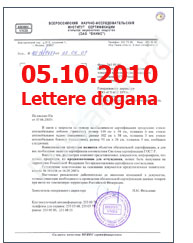|
11 December 2010 |
|
 The IECEE is the body that sets global rules for the certification of electrotechnical products. Thanks to CB Certificate can be performed only once, and at a single institution, evidence of compliance with the IEC and then to see them recognized in all countries that have signed the agreement. The IECEE is the body that sets global rules for the certification of electrotechnical products. Thanks to CB Certificate can be performed only once, and at a single institution, evidence of compliance with the IEC and then to see them recognized in all countries that have signed the agreement.
|
|
|
15 October 2010 |
|
 From October 5, 2010 by the Federal Customs Service are accepted the exemption letters issued only by the Ministry of Industry and Trade of the Russian Federation. The exemption letters issued by VNIIS or Rostest will not be accepted. From October 5, 2010 by the Federal Customs Service are accepted the exemption letters issued only by the Ministry of Industry and Trade of the Russian Federation. The exemption letters issued by VNIIS or Rostest will not be accepted.
|
|
12 October 2010 |
|
 From 11 October 2010 entered into force on the order of the Ministry of Health No 351N of 12/05/2010 establishing the risk groups for products subject to hygienic registration and a new tariff. Prices have nearly doubled. From 11 October 2010 entered into force on the order of the Ministry of Health No 351N of 12/05/2010 establishing the risk groups for products subject to hygienic registration and a new tariff. Prices have nearly doubled.
15/10/2010 ORDER CANCELLED! |
|
19 September 2010 |
|
 The Technical Regulations is a document (legal act), which sets technical standards for the mandatory application to the objects of technical regulation. For objects of technical regulation are: production processes, management, storage, transport, sale and disposal of products, including buildings. The Technical Regulations is a document (legal act), which sets technical standards for the mandatory application to the objects of technical regulation. For objects of technical regulation are: production processes, management, storage, transport, sale and disposal of products, including buildings.
The concept of technical regulations was introduced for the first time with Federal Law No. 184, December 27, 2002 "On technical regulation", which included the replacement of tens of thousands of GOST and health standards with a few hundred Technical Regulations.
|
|
09 September 2010 |
|
 A few days ago, the situation regarding the certification of wines has affected the head of the Federal Service for the protection of consumer rights and welfare of the people (Rospotrebnadzor) Gennady Onishenko. The entry into force of the new code of the Customs Union on health care has introduced some innovations in this area. If wine was first to import the certification required sanitation, now this product is in the list of products for which the health certificate is required or the registration of the customs union Medicare, as they call it in Russia. A few days ago, the situation regarding the certification of wines has affected the head of the Federal Service for the protection of consumer rights and welfare of the people (Rospotrebnadzor) Gennady Onishenko. The entry into force of the new code of the Customs Union on health care has introduced some innovations in this area. If wine was first to import the certification required sanitation, now this product is in the list of products for which the health certificate is required or the registration of the customs union Medicare, as they call it in Russia.
|
|
|
<< Start < Prev 11 12 Next > End >>
|

